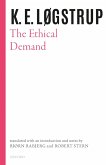How much does ethics demand of us? On what authority does it demand it? How does what ethics demand relate to other requirements, such as those of prudence, law, and social convention? Does ethics really demand anything at all? Questions of this sort lie at the heart of the work of the Danish philosopher and theologian K. E. L?gstrup (1905-1981), and in particular his key text The Ethical Demand (1956). In The Radical Demand in L?gstrup's Ethics, Robert Stern offers a full account of that text, and situates L?gstrup's distinctive position in relation to Kant, Kierkegaard, Levinas, Darwall and Luther. For L?gstrup, the ethical situation is primarily one in which the fate of the other person is placed in your hands, where it is then your responsibility to do what is best for them. The demand therefore does not come from the other person as such, as what they ask you to do may be different from what you should do. It is also not laid down by social rules, nor by God or by any formal principle of practical reason, such as Kant's principle of universalizability. Rather, it comes from what is required to care for the other, and the directive power of their needs in the situation. L?gstrup therefore rejects accounts of ethical obligation based on the commands of God, or on abstract principles governing practical reason, or on social norms; instead he develops a different picture, at the basis of which is our interdependence, which he argues gives his ethics a grounding in the nature of life itself.
Dieser Download kann aus rechtlichen Gründen nur mit Rechnungsadresse in A, B, BG, CY, CZ, D, DK, EW, E, FIN, F, GR, HR, H, IRL, I, LT, L, LR, M, NL, PL, P, R, S, SLO, SK ausgeliefert werden.









